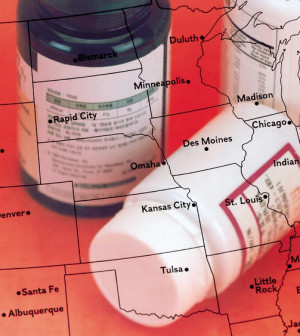- 8 Ways to Increase Dopamine Naturally
- 7 Best Breads for Maintaining Stable Blood Sugar
- Gelatin vs. Collagen: Which is Best for Skin, Nails, and Joints?
- The Long-Term Effects of Daily Turmeric Supplements on Liver Health
- Could Your Grocery Store Meat Be Causing Recurring UTIs?
- Are You Making This Expensive Thermostat Error This Winter?
- Recognizing the Signs of Hypothyroidism
- 10 Strategies to Overcome Insomnia
- Could Artificial Sweeteners Be Aging the Brain Faster?
- Techniques for Soothing Your Nervous System
‘Love Hormone’ Might Heighten the Placebo Effect


TUESDAY, Oct. 22Oxytocin, a hormone that fosters bonding and feelings of trust, may enhance the placebo effect, a new study suggests.
For almost as long as researchers have known about the placebo effect — a phenomenon in which patients say they get benefits from sham therapies they believe to be real — doctors have wondered what causes it and whether it could be exploited to help people.
The new study is one of the first experiments to show that the placebo effect can be chemically boosted, perhaps enough to turn feelings of trust and belief into reliable treatments.
“The susceptibility to develop placebo effects is very different from one person to another,” said lead researcher Dr. Ulrike Bingel, a neurologist at University Duisburg-Essen, in Essen, Germany.
“Some people have very large placebo effects and others don’t, and it would be very nice to have a pharmaceutical option to help people who are not so good at producing placebo analgesia on their own to compliment the standard medical treatment,” Bingel said.
For the study, German researchers recruited 80 healthy men in their 20s. Half were given a whiff of oxytocin nasal spray, while the other half snorted a look-alike saline solution.
The researchers then sat the men down and applied a cream to each patient’s forearms. Then they laid it on thick, so to speak.
The researchers said the first cream contained a powerful pain-reliever and the second cream was a control. They explained to the men that they also needed to test an inert version to account for any properties of the cream itself that might blunt pain.
In reality, neither cream contained any active ingredient.
After 45 minutes, researchers touched a hot probe to the spots where they had applied the cream and they measured the differences in how the men rated their pain between the two sites.
On a scale from zero to 100, the men who had sniffed the oxytocin rated their pain on the arm with the “active” cream around 47 points, on average. The arm with the control cream rated an average score of 59, a difference of 12 points.
Men who got the saline spray also experienced a placebo effect, but theirs was smaller. They felt only about seven points of difference between the two arms.
The findings are published as a research letter in the Oct. 23/30 issue of the Journal of the American Medical Association.
How does it work? Larry Young, director of the Conte Center for Oxytocin and Social Cognition at Emory University in Atlanta, explains.
“What oxytocin seems to have done is to make people trust the clinician and to believe what they are saying is true,” Young said.
Young has studied the role of oxytocin in social bonding and monogamy, but he was not involved in the research.
Oxytocin is a hormone produced by a gland at the base of the brain. In childbirth, it helps to stimulate uterine contractions that bring on labor and get milk flowing to the breasts. Studies have also shown that it plays a big role in social bonding, helping to forge closeness between friends, lovers, spouses, and new parents and their babies.
“Oxytocin helps create a connection between one individual and another,” Young said. “When you’re looking another person in the eyes and you’re really caring about the other person there, you’re releasing oxytocin.” And that’s what good, empathetic doctors have always done to gain their patients’ trust, he said.
“I happen to believe that is one of the mechanisms creating the placebo effect in the first place,” Young said.
“It makes sense that if you give a person a bigger boost of oxytocin than they would be getting in the first place, that you would enhance this effect,” he said.
More information
For more information on the placebo effect, head to the U.S. National Center for Complementary and Alternative Medicine.
Source: HealthDay
Copyright © 2026 HealthDay. All rights reserved.










